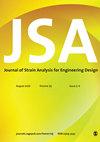新型梯形通道管状通道角挤压Al-6061管残余应力分布的实验与数值研究
IF 1.4
4区 工程技术
Q3 ENGINEERING, MECHANICAL
Journal of Strain Analysis for Engineering Design
Pub Date : 2022-08-04
DOI:10.1177/03093247221113229
引用次数: 1
摘要
管状通道角压法(TCAP)是一种适用于超细晶(UFG)和纳米结构(NS)管的严重塑性变形(SPD)技术。在成形方法中,残余应力的测量是非常重要的,因为残余应力对被加工样品的影响很大。因此,确定金属中由TCAP方法产生的残余应力是非常重要的。本文对Al-6061管材在TCAP过程中的残余应力分布进行了实验和数值研究。为此,首先在Al-6061管上应用TCAP工艺,然后测量TCAP管中产生的残余应力。实验中采用Sachs法测量残余应力。Sachs法是测量轴对称圆柱形试样残余应力的一种破坏性强、方便有效的方法。Sachs法测量的残余应力表明,残余应力分别产生于管的外表面和内表面。此外,数值模拟结果与实验方法的残余应力分布测量结果吻合较好。本文章由计算机程序翻译,如有差异,请以英文原文为准。
Experimental and numerical investigation of residual stress distribution in Al-6061 tubes under using tubular channel angular pressing process by new trapezoidal channel
Tubular channel angular pressing (TCAP) method is an appropriate severe plastic deformation (SPD) techniques for the generation of ultra-fine grained (UFG) and nanostructured (NS) tubes. In forming methods, the measurement of residual stresses is very important due to their significant effects on the processed samples. Therefore, determining the residual stresses created by the TCAP method in metals is of great importance. In this research, the distribution of residual stresses in Al-6061 tubes under the TCAP process, was studied experimentally and numerically. For this purpose, first the TCAP process was applied on Al-6061 tubes and after that the residual stresses generated in the TCAPed tubes were measured. Sachs method was used experimentally to measure the residual stresses. Sachs method is one of the destructive, convenient and efficient methods for measuring the residual stresses of axisymmetric cylindrical samples. Residual stresses measured by Sachs method in the processed samples showed that the tensile and compressive residual stresses were created on the external and internal tube surfaces, respectively. In addition, a good agreement was existed between the results of the numerical simulation and experimental methods for measuring the residual stress distribution.
求助全文
通过发布文献求助,成功后即可免费获取论文全文。
去求助
来源期刊

Journal of Strain Analysis for Engineering Design
工程技术-材料科学:表征与测试
CiteScore
3.50
自引率
6.20%
发文量
25
审稿时长
>12 weeks
期刊介绍:
The Journal of Strain Analysis for Engineering Design provides a forum for work relating to the measurement and analysis of strain that is appropriate to engineering design and practice.
"Since launching in 1965, The Journal of Strain Analysis has been a collegiate effort, dedicated to providing exemplary service to our authors. We welcome contributions related to analytical, experimental, and numerical techniques for the analysis and/or measurement of stress and/or strain, or studies of relevant material properties and failure modes. Our international Editorial Board contains experts in all of these fields and is keen to encourage papers on novel techniques and innovative applications." Professor Eann Patterson - University of Liverpool, UK
This journal is a member of the Committee on Publication Ethics (COPE).
 求助内容:
求助内容: 应助结果提醒方式:
应助结果提醒方式:


